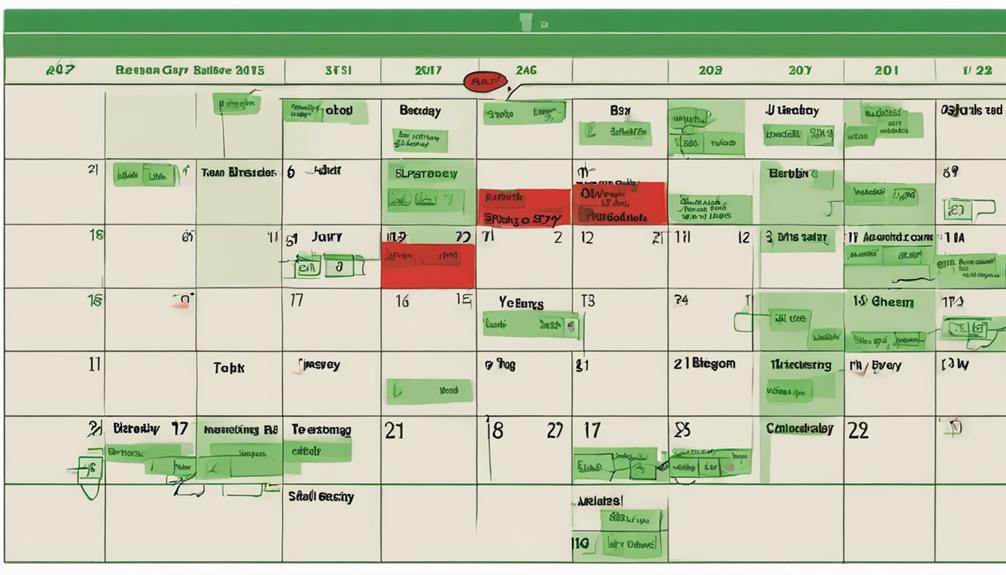10 Solutions for Rabbit Reproduction Issues
To manage rabbit reproduction successfully, you must identify health issues early, maintain proper nutrition, provide adequate nesting materials, separate bucks and does, monitor mating behavior closely, consult with a veterinarian, and control breeding schedules.
But how can you ensure that these solutions effectively address the complex challenges associated with rabbit reproduction? Stay tuned for insightful strategies that can make a significant difference in managing rabbit populations and promoting their well-being.
Identify Health Issues Early
To ensure the well-being of your rabbits, be vigilant in spotting any signs of health issues early on. Regular check-ups are crucial in maintaining your rabbits' health. Make sure to schedule routine visits to the veterinarian to monitor your rabbits' overall well-being and catch any potential health issues before they escalate. During these check-ups, the vet can assess your rabbits' weight and provide guidance on weight management if necessary. Proper weight management is essential for your rabbits' health, as obesity can lead to various health problems.
In addition to regular check-ups, it's important to monitor your rabbits' weight at home. Keep track of their weight and ensure it stays within a healthy range. Sudden weight loss or gain can be indicative of underlying health issues, so it's essential to address any changes promptly. By staying proactive and observant, you can address any potential health issues early on, ensuring the well-being of your rabbits.
Maintain Proper Nutrition
Monitoring your rabbits' diet closely is essential for ensuring they receive the proper nutrition for their well-being. Here are some key points to help you maintain proper nutrition for your rabbits:
- Dietary supplements: Integrate dietary supplements into your rabbits' meals to ensure they're getting all the necessary vitamins and minerals. Consult with a veterinarian to determine the right supplements for your rabbits' specific needs.
- Feeding schedule: Establish a consistent feeding schedule for your rabbits to regulate their food intake and maintain their health. Make sure they've access to fresh hay, water, and a balanced pellet diet daily.
- Variety in diet: Offer a variety of fresh vegetables and fruits to your rabbits in moderation. This won't only provide them with essential nutrients but also keep mealtime interesting for them.
Provide Adequate Nesting Materials
Ensuring your rabbits have access to suitable nesting materials is crucial for their comfort and well-being. Understanding your rabbits' nesting habits is essential for providing the right environment for them. Rabbits are natural burrowers and have a strong instinct to create a safe and cozy space for their young. By offering appropriate nesting materials, you can help your rabbits exhibit their natural behaviors and reduce stress during the reproduction process.
When it comes to material types, there are several options to consider. Timothy hay, straw, shredded paper, and dried grasses are popular choices for nesting materials. These materials are safe for rabbits to handle and arrange according to their preferences. Providing a variety of textures can also help rabbits build more comfortable nests. Avoid using materials like cedar or pine shavings, as they can be harmful to rabbits' respiratory systems.
To encourage your rabbits to engage in nesting behaviors, place the materials in a quiet and secluded area of their enclosure. This will give them the privacy they need to construct their nests without disturbances. Additionally, ensure that the nesting materials are clean and dry to maintain a hygienic environment for both the rabbits and their offspring.
Separate Bucks and Does
For optimal breeding management, keep bucks and does separated. This practice helps in controlling mating and ensures a more organized breeding program. When bucks and does are kept apart, it becomes easier to monitor their mating behavior closely and to prevent any unplanned or undesired matings.
Here are some essential points to consider when separating bucks and does:
- Housing requirements: Bucks and does should have separate living spaces to prevent accidental matings. Each rabbit should have enough space to move around comfortably and should be provided with appropriate bedding, food, and water. Make sure the housing is secure to avoid any escape attempts or aggressive behaviors between rabbits.
- Behavioral indicators: Pay attention to the rabbits' behaviors when they're in close proximity to each other. Signs of mounting, chasing, or aggressive behaviors indicate that the rabbits are ready to breed. Separating them at this stage can prevent any unwanted pregnancies and ensure a more controlled breeding process.
- Monitoring: Regularly observe the rabbits for any signs of heat or readiness to mate. By keeping bucks and does separated and monitoring their behaviors closely, you can plan and schedule breedings more effectively, leading to a more successful reproduction program.
Monitor Mating Behavior Closely
To ensure successful breeding management, closely observe the mating behaviors of rabbits when they're in close proximity to each other. Behavior observation is crucial for maximizing breeding success. When monitoring the rabbits, pay attention to their reproductive activities and mating habits. By closely watching their interactions, you can identify signs of successful mating or potential issues that may hinder breeding outcomes.
Reproductive monitoring plays a vital role in ensuring that the mating process is going smoothly. Rabbits have specific behaviors and body language cues that indicate their readiness to mate. Males may exhibit mounting behavior, chasing the female, or making soft clucking sounds to attract her. Females, on the other hand, may display a receptive posture by lifting their tails and remaining still for mating.
Consult With a Veterinarian
Consider scheduling a consultation with a qualified veterinarian to address any concerns or questions regarding rabbit reproduction and breeding management. Your veterinarian can provide valuable insights and guidance to ensure the reproductive health of your rabbits. Here are a few reasons why seeking veterinary advice is crucial:
- Expertise: Veterinarians specialize in animal health and can offer specific advice tailored to your rabbits' needs. They can assess the overall reproductive health of your rabbits and provide recommendations for optimal breeding management.
- Preventive Care: Regular consultations with a veterinarian can help prevent potential reproductive issues before they escalate. They can advise on proper nutrition, hygiene practices, and potential breeding risks to maintain the well-being of your rabbits.
- Medical Intervention: In case of any reproductive health concerns or complications, veterinarians can provide timely medical intervention. They can diagnose and treat various reproductive disorders, ensuring the health and safety of your rabbits.
Consulting with a veterinarian is a proactive step towards ensuring the successful reproduction and breeding of your rabbits. Their expertise and guidance can help you navigate any challenges and promote the overall well-being of your rabbitry.
Control Breeding Schedule

Maintain a consistent breeding schedule to effectively manage rabbit reproduction. By implementing proper breeding management techniques, you can exercise reproductive control over your rabbit population. Establishing a routine for breeding not only helps in monitoring the process but also aids in preventing uncontrolled mating and unexpected litters.
Consistency is key when it comes to controlling the breeding schedule of your rabbits. Set specific times for mating to regulate the reproductive cycle effectively. By doing so, you can avoid accidental pregnancies and ensure that each breeding session is intentional and carefully planned. Monitoring the breeding schedule allows you to track the reproductive patterns of your rabbits and make adjustments as needed.
Proper breeding management involves keeping detailed records of each mating session. Note the dates, pairings, and any relevant observations to help you analyze and optimize the breeding schedule. This information can also assist in predicting future mating times and potential birth dates, aiding in overall reproductive control.
Maintaining a controlled breeding schedule is essential for responsible rabbit ownership. It not only prevents overpopulation but also ensures the health and well-being of your rabbits. By following a consistent breeding plan and practicing reproductive control, you can effectively manage your rabbit population and promote a sustainable breeding program.
Consider Neutering or Spaying
Keeping your rabbit population under control also involves considering the option of neutering or spaying your rabbits to prevent unintended pregnancies. Neutering refers to the castration of male rabbits, while spaying involves removing the reproductive organs of female rabbits. This not only helps prevent overpopulation but also has additional benefits for the health and behavior of your rabbits.
Here are three reasons to consider neutering or spaying your rabbits:
- Prevent Overpopulation: Neutering or spaying your rabbits is a proactive measure to prevent the birth of unwanted litters. With rabbits being prolific breeders, this can quickly lead to overpopulation issues if left unchecked. By taking this step, you can help control the rabbit population and avoid the challenges associated with managing a large number of rabbits.
- Behavioral Changes: Neutering or spaying can lead to positive behavioral changes in rabbits. Neutered males are less likely to display aggressive behaviors, such as fighting with other rabbits or spraying urine to mark territory. Spayed females are less prone to mood swings and are at a reduced risk of developing reproductive-related health issues.
- Health Benefits: Besides preventing pregnancies, neutering or spaying can also have health benefits for your rabbits. It reduces the risk of certain cancers and infections that are common in unaltered rabbits, ultimately leading to a longer and healthier life for your furry companions.
Frequently Asked Questions
Can Rabbits Reproduce at Any Time of the Year?
Yes, rabbits can reproduce at any time of the year due to their ability for seasonal breeding. Their reproductive hormones aren't tied to specific seasons like some other animals, allowing them to breed year-round.
This flexibility can result in rapid population growth if left unchecked. Monitoring their breeding habits and implementing proper control measures can help manage rabbit populations effectively.
How Can I Tell if My Rabbit Is Experiencing Fertility Issues?
If your rabbit is experiencing fertility issues, you may notice signs such as irregular mating behavior, failed pregnancies, or difficulty conceiving.
Hormonal imbalance can lead to reproductive disorders in rabbits, affecting their ability to reproduce.
It's important to consult with a veterinarian to determine the underlying cause of these issues and explore potential solutions to help your rabbit maintain reproductive health.
Are There Any Specific Health Issues That Can Affect a Rabbit's Ability to Reproduce?
Hormonal imbalances and genetic factors play a significant role in a rabbit's ability to reproduce. These health issues can impact fertility by affecting the rabbit's reproductive system.
Keep an eye out for signs of irregularities in your rabbit's behavior, such as changes in mating behavior or failed pregnancies. It's essential to consult with a veterinarian if you suspect any reproductive health concerns in your rabbit.
How Long Should I Wait Before Considering Breeding My Rabbit Again After She Has Given Birth?
After your rabbit gives birth, wait at least 3-4 months before considering breeding her again. This time allows for postpartum recovery and ensures your rabbit is in optimal health for another pregnancy.
Breeding frequency should be spaced out to prevent health issues and exhaustion. Additionally, be mindful of your rabbit's breeding age and reproductive cycle to promote her well-being and successful reproduction.
What Are the Potential Risks of Not Separating Bucks and Does During Breeding Season?
If you don't separate bucks and does during the breeding season, breeding risks and consequences can arise. Management is crucial to avoid potential problems like uncontrolled breeding, fighting, injuries, and stress on the rabbits.
It's important to carefully plan and supervise the breeding process to ensure the well-being of your rabbits and prevent unwanted situations. Proper separation and monitoring can help maintain a healthy and controlled reproduction environment.
Conclusion
Overall, addressing rabbit reproduction issues requires proactive measures such as monitoring health, nutrition, and breeding schedules.
By identifying problems early, providing proper care, and consulting with a veterinarian when needed, you can prevent unwanted litters and ensure the well-being of your rabbits.
Remember to always prioritize the health and welfare of your rabbits to maintain a happy and healthy breeding environment.
